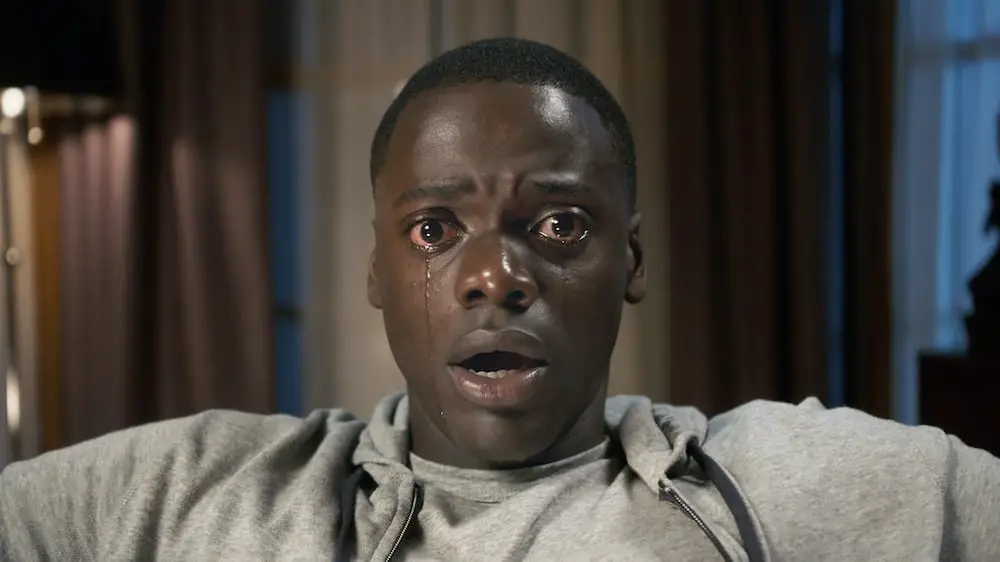2. Get Out – Colin

“It was my favorite movie that I had never seen,” said director Jordan Peele concerning Get Out, his instant-phenomenon cult-horror movie that was released this past February. It seems most critics (it still has a %99 on Rotten Tomatoes) agree with his statement. This movie takes us from a seemingly innocuous interracial relationship and slowly drags us into a black man’s worst existential nightmare. This is not a horror movie with subtle references to racism; this is a movie about racism told brilliantly by way of the horror genre.
Chris Washington (Daniel Kaluuya), our protagonist, travels with his girlfriend, Rose Armitage (Allison Williams) to meet her parents at their estate in the country. His fears are that Rose hasn’t told her parents yet that she’s dating a black man, but she assures him that her parents are not racist and that her father would have “voted Obama in for a third term if he could have.” Oh, swell, nothing to worry about! What follows though, is a tense, well thought out narrative that slowly creeps up on its viewers until we realize (maybe some viewers a bit quicker than others) that the horrors had been hiding in plain sight the entire time.
Upon arrival at Rose’s parents, other than the quirky, eye-rolling awkwardness of two aging white folks (Catherine Keener, Bradley Whitford) going out of their way to be accepting to Chris, things seem only mildly discomforting. The Armitages want it known that they are very aware Chris is black, and they are very okay with it. It gives Chris the creeps. Rose, seemingly open and understanding to his plight thus far, insists that Chris is just being silly and that he has no reason to be feeling so odd and out of place. But when Chris meets the estate staff, who happen to all be black people, it starts to set off some serious internal alarms.
Unable to sleep one night, Chris steps out for a smoke and is offered some hypnotherapy from Rose’s mother that makes him immediately repulsed by cigarettes. Her real intent in the hypnosis though is to send him to the “sunken place,” a traumatic memory in which Chris becomes paralyzed within. This enables her to control him when she needs to.
There are societal issues that boil under the surface and deliberately go unaddressed (you know, like slavery and racism) by the characters in the film; all the characters but one. Chris’s MVP friend Rod (Lilrel Howrey), who seems a bit unhinged and possibly even a bit conspiratorial at first, never lets go of his suspicions that his friend has wandered into a nightmare. Chris keeps in contact with him throughout the film, updating him on all the strange behavior, the awkward “annual get together” where Chris’s otherness is never made more apparent, and of course, the hypnotizing. Rod is the voice of reason that Chris knows he should be listening to, but the Armitages have their claws dug in too deep for him to just walk away.
The title “Get out!” is a warning given by one of the party guests after Chris snaps a picture of him and he suffers what Dean Armitage explains to be an epileptic seizure. It’s also a reference to an old Eddie Murphy comedy bit on why white people don’t just leave all the haunted houses they seem to occupy. The titular warning is echoed by Rod when Chris sends him the photo of the forewarning party guest. Rod identifies the guest as a young man who had been reported to be missing. It’s only when Chris discovers the sick truth of Rose’s methodical kidnappings that he finally brings himself to get out. But by then, it’s too late. The Armitage family has him in their clutches, and plan to enslave his mind, body, and spirit while keeping him trapped in the sunken place and serving them forever.
Peele’s film is a poignant metanarrative for how whites, more specifically “West Wing Liberal” types, may inadvertently see and treat their fellow Black Americans. The (white) characters in the film aren’t your typical buck-toothed bigots waving around Confederate flags. No, these villans are much more subtle, much more calculated and methodical. They are powerful, wealthy, somewhat mundane citizens who possess a haunting fetishization of “black men’s physicality” which they pass down through each generation via tradition.
On top of being a well acted, well-produced film that keeps its audience engaged in the best way a small-budget film like Get Out can, there are also lots of brilliantly subtle ways that Peele evokes both our historical and racial awareness while the creepy narrative unfolds. Peele deliberately uses cotton as a catalyst for our hero to attempt his escape, has Rose separate her colorful fruit loops from her milk, and has a cop asking for Chris’s identification when they hit a deer on their way up to the estate. Rose is adamant that Chris should not have to identify himself because he wasn’t the one driving. The incident goes unreported, and we love Rose for sticking up for a potential injustice, but it’s really only to make sure Chris’s whereabouts can’t be identified by authorities if he were to ever escape this nightmare. But even if he did, the cops would never take his side, right?
Essentially, Get Out is the story of a black man being convinced by his white girlfriend that things are not as bad as he thinks so that he’ll be unable to stop a reality where things are much worse than he could ever have imagined. It is a fantastically dark and topical horror movie, and one of my favorite films of 2017.

